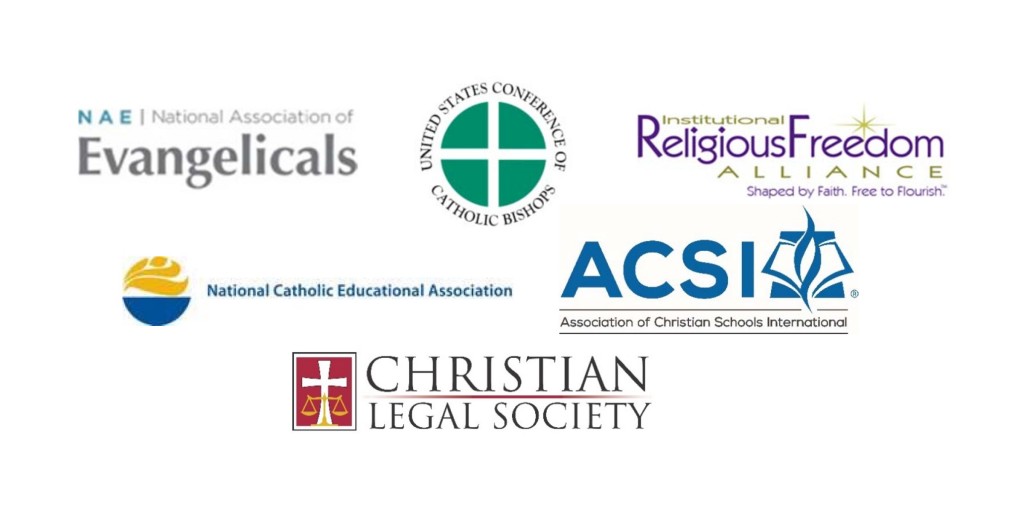
FBOs Give Positive Response to Administration’s Changes to Faith-based Regulations
On October 2, 2015, evangelical and Catholic organizations submitted comments to nine federal agencies that had proposed some changes to the Equal Treatment regulations about how the federal government must relate to faith-based organizations seeking federal funds. The organizations asked for greater uniformity across departments and agencies in the draft changes to the regulations in order to ensure maintenance of a hospitable environment for faith-based services in federal programs.
These agencies had asked for comments: USAID, Agriculture, Education, Health and Human Services, Homeland Security, Housing and Urban Development, Justice, Labor, and Veterans Affairs. All of these federal agencies have had Equal Treatment regulations, modeled on Charitable Choice law adopted during the Clinton Administration, since the Bush administration started the federal faith-based initiative. The organizations that submitted comments together are: US Conference of Catholic Bishops, National Association of Evangelicals, Christian Legal Society, National Catholic Educational Association, Association of Christian Schools International, and the Institutional Religious Freedom Alliance.
The regulatory amendments proposed by the agencies would not change these vital features of the Equal Treatment regulations:
- faith-based organizations can compete for funds on the same basis as secular groups;
- the religious organizations do not lose their religious identity or autonomy as the price of receiving the federal funds;
- beneficiaries cannot be excluded from service because of their religion or lack of it nor be forced to participate in religious activities.
The draft regulations would make these major changes:
- expand to all programs the right of beneficiaries, if they object to the religious character of a provider, to be referred to another provider;
- ensure that beneficiaries get written notice of their religious rights;
- replace the current term, “inherently religious activities,” with a new term, “explicitly religious activities,” to define which activities cannot be funded by federal grants and contracts;
- clarify the distinction between “direct” and “indirect” government funding;
- stress that funding decisions should be made on the basis of merit, without political interference.
In their comments, the religious organizations mainly asked for refinements to the proposed changes. For example, the regulations as drafted would require agencies, in making funding decisions, to avoid even the appearance of political interference, but instead to make the decisions “on the basis of merit, not on the basis of religion or religious belief.” The comments submitted point out that government officials are more likely to be biased against, than for, religion, and propose that the regulations instead should say that the decisions must be made “on the basis of merit, not on a basis for or against religion or religious belief.”
The proposed rules stress the distinction between direct federal funds—grants and contracts—and indirect funding—vouchers, certificates, scholarships. The difference is very important: when the funding received by a religious organization is indirect—it arrives because a beneficiary or patient chooses the organization, not because a government official has selected the provider—then the government funds can underwrite services that include religious expression and activity, such as drug treatment that includes a Christian discipleship component. When the funding is direct, then what will now be called “explicitly religious activities,” such as prayer and worship and Scripture reading, must be kept separate from the federally funded services.
But, as the comments point out, in the draft regulations the consequences of the difference between direct and indirect funding is not consistently carried out. When the funding is indirect, then the beneficiary has a choice of provider, selecting from among an array that includes faith-based and also secular organizations. In such a setting, it makes no sense and it is wrong to require the faith-based providers to exclude explicitly religious activities from the federally funded services, to hunt for a referral for a beneficiary who wants a change, and not to “discriminate” against beneficiaries based on religion. It is the beneficiary who has chosen, and has a right, to services that incorporate religion and it is the beneficiary who has chosen this provider and should, if the provider is not acceptable, choose a different one. And it is the system of choice itself that protects beneficiaries from religious discrimination. Some of the proposed rules take account of these differences and some do not. All of them should.
The comments ask for one other significant change. A few of the Notices of Proposed Regulations (the draft amendments to the regulations plus a description and argument for the changes) note that some federal funding programs include a ban on religious hiring by recipients of the funds. This is unusual: usually program regulations are silent about the employment practices of the recipient organizations, thus leaving religious organizations free to consider religion when they hire and fire, even though they accept federal funding. Congress adopted a remedy, two decades ago: the Religious Freedom Restoration Act (RFRA). Because of RFRA, a religious organization faced with a restriction on religious hiring in a funding program can request that the restriction be set aside as an unjustifiable burden on its religious exercise. The Department of Justice’s Office of Legal Counsel has ruled that religious organizations can do this and the Department of Justice offers a certificate that a religious organization can submit if it encounters such a restriction in a DOJ program. But the proposed regulations do not implement this certification process in other federal agencies, but only suggest that a religious organization consult with the agency if it encounters such a restriction. The comments submitted by the religious organizations ask that the DOJ process be applied across agencies via changes to the regulations.
And the submitted comments ask that these agencies make it a requirement on themselves that they periodically train their officials in these amended Equal Treatment regulations, so that the promised “level playing field” is what faith-based organizations will in fact encounter if they apply for federal funds.
